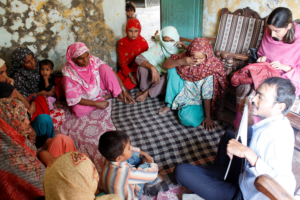Imagine what would happen if a bank received the following proposal: Take all the potential new clients in your market, and all the profits you stand to gain, then cut those numbers in half. Leave all that money on the table for your competitors to grab. Sound enticing?
While it might appear absurd for a financial institution to make a decision like this, a surprising number of banks already do. By ignoring or vastly underestimating the women’s market, those financial institutions do an enormous disservice to themselves, not to mention their potential customers. They also make it much harder to shrink and eventually eliminate the financial inclusion gender gap.

The problem is, those assumptions are wrong, and they’re costing financial institutions worldwide millions in unrealized profits or expanded market share. Investing in women is not charity: It’s smart business.
Women, it turns out, display nearly identical transaction patterns as men do once they’re on-boarded at a financial institution and are comfortable using its platform. But because most financial institutions don’t disaggregate data by gender, they have no way of seeing how closely women’s and men’s banking behavior matches up.
While it’s true that banks also ignore women because of a number of actual impediments that have traditionally made it difficult for women to use them—including a lack of time or money to travel to a branch—those issues are presenting less of an obstacle thanks to digital financial services (DFS). DFS are enabling institutions to reach millions of rural unbanked women who could never before access formal banking.
While more intangible issues that impact women’s financial activity—such as a distrust in banks and a hesitation about revealing confidential information—are yet to be resolved everywhere, they’re less of a prohibitive factor with the rise of digital banking.

In Nigeria, the latest data should help overturn any bias, conscious or otherwise, about women’s value as clients. An analysis of non-outlier banking clients from 2013-2016, conducted by Women’s World Banking in partnership with Diamond Bank, shows that women keep higher bank accounts than men on average: ₦1407 for women, ₦1306 for men. Women also deposit and withdraw the same number of times annually, about 28, as men do. The data also shows that women deposit in amounts roughly identical to men: ₦5382 on average for women, only slightly lower than the ₦5512 figure for men. Women and men withdraw similar amounts too: an average of ₦17,663 for women compared to ₦18,286 for men.
The data paints a clear picture, but nonetheless, false perceptions that women keep lower balances, and transact more often but in small amounts, are ingrained even among experienced agents—and even among women agents. So Diamond Bank, for one, is actively putting the findings to use in combating gender bias among its agents, as demonstrated in this simple but impactful data analysis. Using data to train agents on the importance of reaching out to women is crucial and profitable, not just for women but for institutions and their agents too.
Women’s World Banking’s partner institution in Pakistan, the telecom provider JazzCash has found a similar trend in their data: once women were on-boarded to the product, their transactional behavior was very similar to men. This helped focus JazzCash’ efforts towards client acquisition, as they begin investing more significantly in the women’s market

Figuring out how to target women more effectively—a challenge that varies region by region—has the added bonus of helping institutions kill two birds with one stone. The data shows that when financial products and consumer marketing are designed to work for women, men display a high uptake rate too. The reverse, however, is not true: Products designed with only men in mind tend to fall flat with women.
Now that the latest data is in, there’s never been a more urgent time for financial institutions to build on the ways in in which innovators like Diamond Bank and JazzCash are growing their businesses while serving women better. It’s simply too costly not to.




